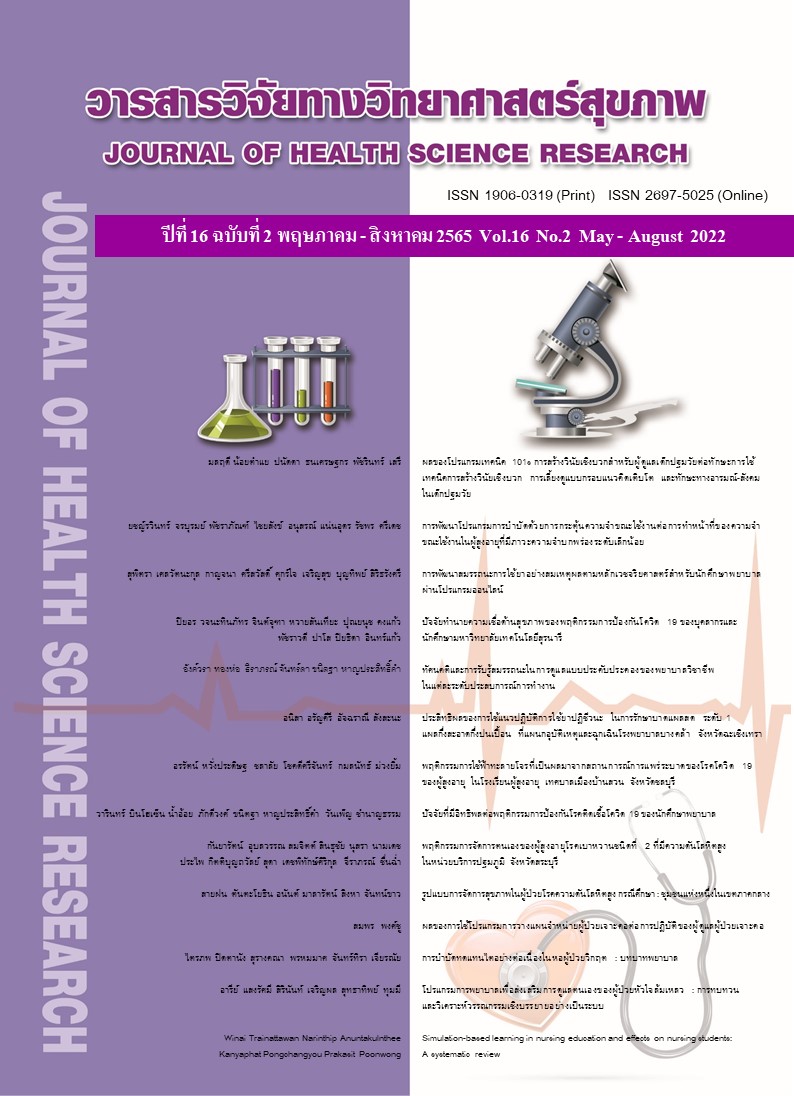รูปแบบการจัดการสุขภาพในผู้ป่วยโรคความดันโลหิตสูง กรณีศึกษา: ชุมชนแห่งหนึ่งในเขตภาคกลาง
Main Article Content
บทคัดย่อ
บทนำ : โรคความดันโลหิตสูงเป็นปัญหา สาธารณสุขที่สำคัญ การศึกษาการจัดการสุขภาพในผู้ป่วยโรคนี้ในระดับบุคคล ครอบครัว และชุมชน จะสามารถนำไปใช้พัฒนารูปแบบจัดการสุขภาพในผู้ป่วยได้อย่างเหมาะสม
วัตถุประสงค์การวิจัย : เพื่อศึกษาบริบทในการจัดการสุขภาพของผู้ป่วยโรคความดันโลหิตสูงในชุมชน ศึกษากระบวนการเปลี่ยนแปลงพฤติกรรมในระดับบุคคลตามแบบจำลอง ADKAR และศึกษาพฤติกรรมสุขภาพของผู้ป่วยโรคความดันโลหิตสูง
วิธีการวิจัย : การวิจัยเชิงคุณภาพนี้มีผู้มีส่วนร่วมในการวิจัย ประกอบด้วยทีมจัดการสุขภาพในชุมชน จำนวน 10 คน ผู้ป่วยโรคความดันโลหิตสูง จำนวน 16 คน และผู้ดูแล จำนวน 16 คน เก็บข้อมูลโดยการสนทนากลุ่ม การสัมภาษณ์ และการให้ตอบแบบสอบถาม และวิเคราะห์ข้อมูลโดยการวิเคราะห์เนื้อหา และการใช้สถิติเชิงพรรณนา
ผลการวิจัย : บริบทในการจัดการสุขภาพของผู้ป่วยโรคความดันโลหิตสูงในชุมชน ประกอบด้วยกระบวนการวางแผน การบริหารจัดการ การดำเนินการ และการติดตามประเมินผล ผลการวิเคราะห์กระบวนการเปลี่ยนแปลงพฤติกรรมด้านการตระหนักรู้ ด้านความปรารถนา ด้านความรู้ ด้านความสามารถ ด้านการเสริมแรงสนับสนุน ของผู้ดูแลและผู้ป่วยมีค่าเฉลี่ยอยู่ในระดับมากทุกด้าน และผู้ป่วยโรคความดันโลหิตสูงมีพฤติกรรมสุขภาพภาพรวมด้านอาหาร ออกกำลังกาย อารมณ์ สูบบุหรี่ สุรา ยา อยู่ในระดับปานกลาง (M=3.31)
สรุปผล : ผลการวิจัยทำให้ทราบบริบทในการจัดการสุขภาพของผู้ป่วยโรคความดันโลหิตสูงในชุมชน และระดับการเปลี่ยนแปลงพฤติกรรมทั้งในระดับบุคคล ครอบครัว และชุมชน และพฤติกรรมของผู้ป่วยโรคความดันโลหิตสูง อันนำไปเป็นข้อมูลเพื่อพัฒนารูปแบบการจัดการสุขภาพที่เหมาะสมต่อไป
Downloads
Article Details

อนุญาตภายใต้เงื่อนไข Creative Commons Attribution-NonCommercial-NoDerivatives 4.0 International License.
บทความที่ได้รับการตีพิมพ์เป็นลิขสิทธิ์ของวิทยาลัยพยาบาลบรมราชชนนี จังหวัดนนทบุรี
ข้อความที่ปรากฏในบทความแต่ละเรื่องในวารสารวิชาการเล่มนี้เป็นความคิดเห็นส่วนตัวของผู้เขียนแต่ละท่านไม่เกี่ยวข้องกับวิทยาลัยพยาบาลบรมราชชนนี จังหวัดนนทบุรี และคณาจารย์ท่านอื่น ในวิทยาลัยฯ แต่อย่างใด ความรับผิดชอบองค์ประกอบทั้งหมดของบทความแต่ละเรื่องเป็นของผู้เขียนแต่ละท่าน หากมีความผิดพลาดใด ๆ ผู้เขียนแต่ละท่านจะรับผิดชอบบทความของตนเองแต่ผู้เดียว
เอกสารอ้างอิง
World Health Organization. Primary prevention of essential hypertension. World Health Organization Technical Report Series; 2003. p.5-39.
Bureau of Policy and Strategy, Ministry of Public Health. Strategic Plan of The Ministry of Public Health 2017-2021; 2017. (in Thai).
Bureau of Epidemiology, Department of Disease Control, Ministry of Public Health. Weekly Surveillances Report. Nonthaburi : Bureau of Epidemiology, Department of Disease Control, Ministry of Public Health; 2017. (in Thai).
Bureau of Non Communicable Disease, Department of Disease Control, Ministry of Public Health. NCDs Surveillances Report 2019. Nonthaburi: Aksorn Grphic and Design Publishing Limited. (in Thai).
Department of Disease Control, Ministry of Public Health. Thailand National NCD plan 2017-2021; 2015:p.23-26. (in Thai).
Non-communicable disease office. Diabetes and Hypertensive Prevention Service Model. Nonthaburi: The Printing Office Agency to assist veterans in Roy al Shu patham.; 2017.p.9-19. (in Thai).
Hiatt JM. Adkar: a model for change in business government and our community. Colorado, Prosci Learning Center Publications; 2006.
Health Education Division. Department of Health Service Support, Ministry of Public Health. Promoting the development of health literacy and health behavior; 2018; p.12-14. (in Thai).
Srivanichakorn S, et al. Knowledge Management and Aiding Practices of Tambon Health Promoting Hospitals: Management of chronic disease patients with diabetes and high blood pressure. Nonthaburi : Sahamit Printing and Publishing; 2010. (in Thai).
Uthaipattanacheep W, et al. Community-basedhealth behavior modification. Bangkok: Health Education Division; 2013. (in Thai).
Becker MH. The health belief model and personal health behavior. Health Education
Monographs; 1974;2:324–508. doi. 10.1 177/109019817400200407.
Murdaugh CL, Parsons MA, Pender NJ. Health promotion in nursing practice. 8th ed. New Jersey: Pearson; 2019.
Sarakshetrin A et al. The effects of using health behavior changing program (food, exercise, emotion, smoking, and alcohol cessation) among Village Health Volunteers at Klongchanak, Muang District, Suratthani Province. The Southern College Network Journal of Nursing and Public Health. 2017;4(1):256-64. (in Thai).
Chormai P, Pranprawit A. Effect of health promotion program for promoting health behavior change in groups at high risk of high blood pressure at Bankhaodin Health Promotion Hospital, Khaopanom District, Krabi Province. Journal of Graduate School, Pitchayatat, Ubon Ratchathani Rajabhat University; 2015;10(1):15-24. (in Thai).
Syed IUB. Diet, physical activity, and emotional health: what works, what doesn’t, and why we need integrated solutions for total worker health. BMC Public Health; 2020;20(1):152. doi. 10.1186/s12889-020-8288-6.


